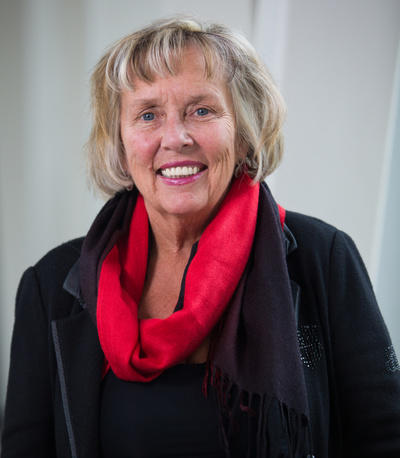April 25, 2016
Nursing researcher helps improve health-care system from front lines to administrative levels

Deborah White is an experienced researcher focused on Alberta's Strategic Clinical Networks.
Riley Brandt, University of Calgary
The baby boy is so frail and tiny that he fits in nurse Deborah White’s hand. While she cares for him in the brightly lit Neonatal Intensive Care Unit (NICU), there are alarms going off, codes being called, and people chattering.
White is asking herself: If the little baby does survive, what will his life be like? What will life be like for his family, when she has seen other families break up in the wake of wrenching health challenges? How can she help?
It was 30 years ago when she was posing these and other vital questions about health care while working on the front lines in an Alberta hospital. She saw the intricate web of care that reaches from the hospital into the community.
And her curiosity would spark groundbreaking research.
“I soon realized I could help patients in another way, by examining processes and structures in teams and organizations,” says White, a Registered Nurse (RN) who would gain her PhD and become senior researcher and associate professor in the University of Calgary Faculty of Nursing. She was recently appointed interim dean of University of Calgary in Qatar.
“I wanted to know how these systems worked and how they can be improved.”
Examining networks means better payoff for patients and community
Nowadays, White is at the vanguard of health-care research that considers the potential for improvements from the front lines in bustling hospitals to the highest levels of administration. She and her colleagues examine problems and suggest new perspectives to create solutions.
Her current research focuses on Alberta’s Strategic Clinical Networks (SCNs). These 11 operational networks under the auspices of Alberta Health Services (AHS) are comprised of families, health leaders, clinicians, patients and researchers working together for better quality health care.
White is helping to examine SCNs that include cardiovascular and stroke, bone and joint health, emergency, addictions and mental health, seniors health, cancer, surgery, diabetes, obesity, nutrition and critical care.
“Health system research and evaluation is important because the health-care system makes significant investments in the health-care system,” says White. “When I can help health-care teams enhance their skills and competencies, it means a better payoff for the patients and the community at large.”
Stroke Action Plan pioneers a new model in care for rural areas
The AHS Stroke Action Plan solves a health-care problem with an innovative solution that has gained national recognition for pioneering a new model in rural stroke care.
The plan aims to ensure stroke patients in small urban and rural settings get the same level of care as they do in larger centres. The project has exceeded expectations and has garnered a Co-Chairs’ Award for Impact from the Canadian Stroke Congress.
“In this project, we helped the team look at the pre-planning and implementation stages and sustainment of their work,” says White. “In sharing knowledge about how people work within groups and all the factors that can affect implementation of care, the team can then see how they might use the information — now and for future projects, too.”
Narrowing gap for academic research to reach bedside
Shelley Vallaire, senior provincial director of the Cardiovascular Health and Stroke Clinical Network, said the AHS Stroke Action Plan now has teams from different locations sharing knowledge quickly, efficiently, and enthusiastically.
“It typically takes from 15 to 17 years for academic research to reach the bedside,” says Vallaire. “We don’t have time for that now because the world changes so rapidly. (White) is helping us to narrow that gap.”
White continues to examine processes and structures in teams and organizations as she works with her colleagues in the University of Calgary Cumming School of Medicine and the O’Brien Institute of Public Health. Her work was recognized in 2015 with a nomination for a university Peak Scholar Award for entrepreneurship, innovation, and community impact.
“(White) is encouraging us to think about the value of working within a network,” says Vallaire. “Her work is helping us to develop quality improvements.”
This article originally appeared in the April 25th issue of UToday.

